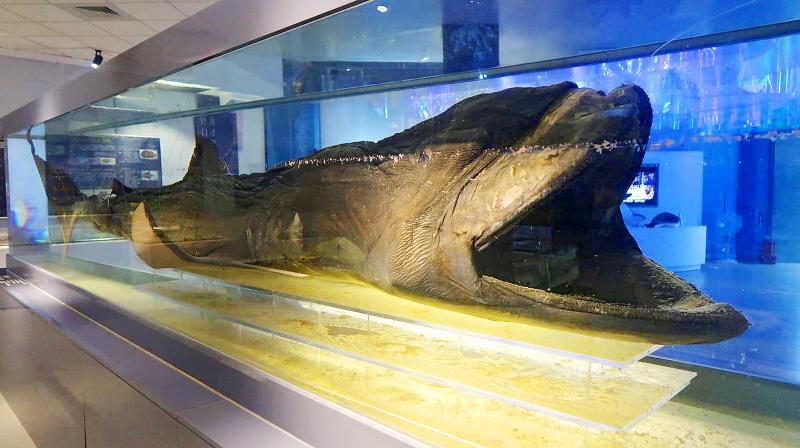The Ocean Conservation Administration (OCA) yesterday said it needs more data to decide whether to protect megamouth sharks, after an animal protection group said fishing vessels have been catching the species without restrictions.
A drift net vessel this week caught six of the deep-water sharks over four consecutive days off the coast of Hualien County, the Environment and Animal Society of Taiwan (EAST) wrote on Facebook on Thursday.
In 2018 and last year, another three vessels caught a total of 72 megamouth sharks, including 70 off Hualien and two off Yilan County, it wrote.

Photo provided by the Ocean Conservation Administration
As big as the protected whale sharks species, megamouth sharks are rarer, as only 226 have been documented since they were discovered and named in 1976, and 145 have been caught near Taiwan, EAST wrote.
Accusing the four vessels of purposely catching the sharks, the group urged the OCA and the Fisheries Agency to ban capturing the sharks, saying that the waters off the east coast have become a graveyard for the species due to government inaction.
The agencies said they need more data to decide whether to designate megamouth sharks as a protected species.
The International Union for Conservation of Nature and Natural Resources lists the species under “least concern,” the OCA said.
In July last year, the agency formed a work group with the Fisheries Agency, the Coast Guard Administration, experts and civic groups to promote the stock assessment and conservation of megamouth sharks, the OCA said.
It said it would work with fishers to install devices on the sharks to track their migratory paths.
Promoting the conservation of cartilaginous fishes has been the agency’s task since its founding in 2018, it said, adding that it listed whale sharks and giant oceanic manta rays as protected species on June 1.
As it takes time to complete the legal process of granting a species protected status, the Fisheries Agency could first restrict vessels’ activities if it deems they are detrimental to a species, just as it had done with whale sharks, OCA senior specialist Ko Yung-chuan (柯勇全) said.
Designating a species as protected without solid scientific evidence risks creating conflicts and setting a poor standard, Ko said.
The Fisheries Agency in 2013 started requiring fishers to file reports when catching megamouth sharks, and 136 have been reported since then, Fisheries Regulation Division chief Liu Fu-sheng (劉福昇) said.
Fishers can trade the sharks after filing reports, Liu said.
The agency needs more evidence to impose any restrictions, he said, adding that it continues to participate in the OCA work group.

Taiwanese can file complaints with the Tourism Administration to report travel agencies if their activities caused termination of a person’s citizenship, Mainland Affairs Council Minister Chiu Chui-cheng (邱垂正) said yesterday, after a podcaster highlighted a case in which a person’s citizenship was canceled for receiving a single-use Chinese passport to enter Russia. The council is aware of incidents in which people who signed up through Chinese travel agencies for tours of Russia were told they could obtain Russian visas and fast-track border clearance, Chiu told reporters on the sidelines of an event in Taipei. However, the travel agencies actually applied

Japanese footwear brand Onitsuka Tiger today issued a public apology and said it has suspended an employee amid allegations that the staff member discriminated against a Vietnamese customer at its Taipei 101 store. Posting on the social media platform Threads yesterday, a user said that an employee at the store said that “those shoes are very expensive” when her friend, who is a migrant worker from Vietnam, asked for assistance. The employee then ignored her until she asked again, to which she replied: "We don't have a size 37." The post had amassed nearly 26,000 likes and 916 comments as of this

New measures aimed at making Taiwan more attractive to foreign professionals came into effect this month, the National Development Council said yesterday. Among the changes, international students at Taiwanese universities would be able to work in Taiwan without a work permit in the two years after they graduate, explainer materials provided by the council said. In addition, foreign nationals who graduated from one of the world’s top 200 universities within the past five years can also apply for a two-year open work permit. Previously, those graduates would have needed to apply for a work permit using point-based criteria or have a Taiwanese company

The Shilin District Prosecutors’ Office yesterday indicted two Taiwanese and issued a wanted notice for Pete Liu (劉作虎), founder of Shenzhen-based smartphone manufacturer OnePlus Technology Co (萬普拉斯科技), for allegedly contravening the Act Governing Relations Between the People of the Taiwan Area and the Mainland Area (臺灣地區與大陸地區人民關係條例) by poaching 70 engineers in Taiwan. Liu allegedly traveled to Taiwan at the end of 2014 and met with a Taiwanese man surnamed Lin (林) to discuss establishing a mobile software research and development (R&D) team in Taiwan, prosecutors said. Without approval from the government, Lin, following Liu’s instructions, recruited more than 70 software